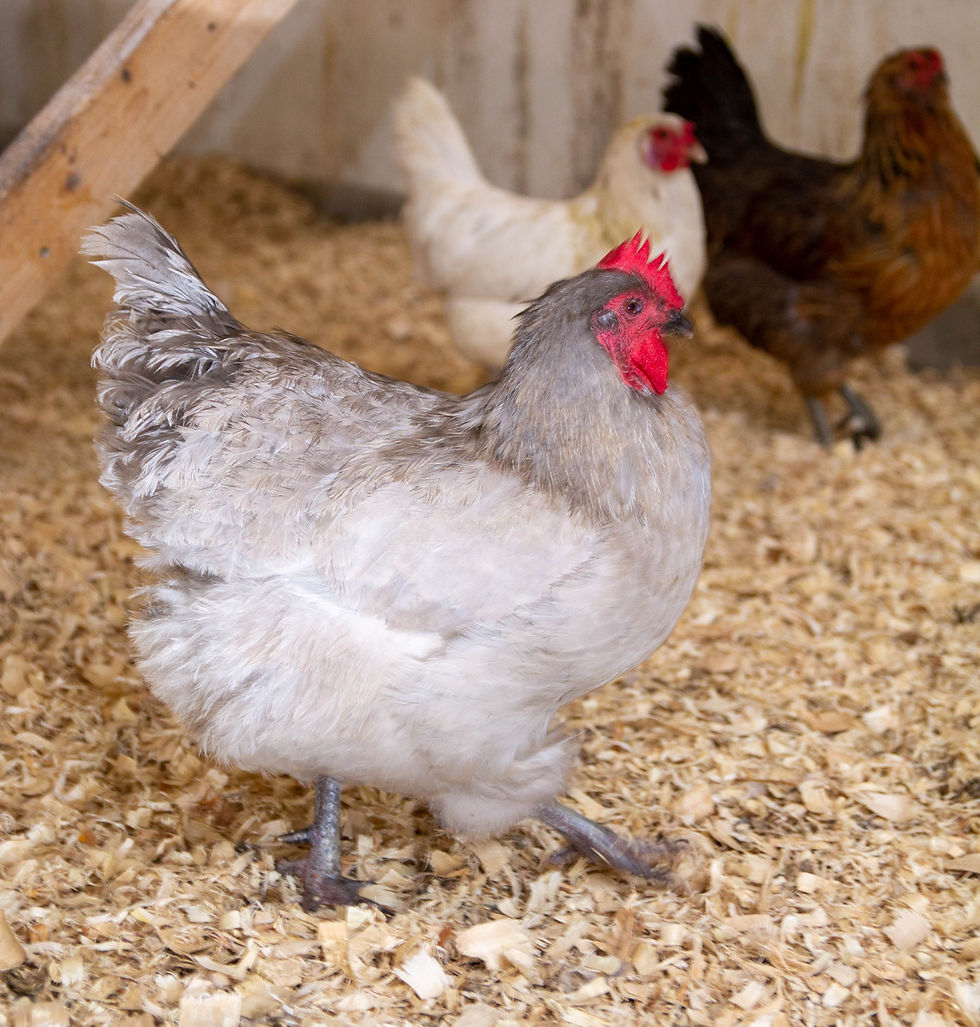Understanding the Growth Stages of a Hen: From Chick to Mature Layer
- Annie
- Feb 6
- 4 min read

There is nothing better than getting little chicks. I love listening to their tiny peeps and spend hours just observing their behaviors. They are tiny, fluffy, and usually so sweet! It’s important to enjoy this stage because it doesn’t last long!
Chicks grow into chickens really fast! And if you want happy, healthy hens that will lay plenty of eggs, it’s important to understand each stage of their development and provide the right nutrition and care along the way.

Stage 1: The Chick Stage (0-6 Weeks)
Once the chicks hatch, they enter the chick stage. In these early weeks, chicks are highly dependent on their mother (or a brooder) for warmth, food, and water. During this time, proper care and nutrition are vital for healthy growth. Let me break these weeks down for you.
Week 1: Chicks are covered in downy feathers and require a heat source. They begin to walk and peck for food. I always use the Baby Chick Care Kit to make sure all their systems get off to a strong start.
Want to set up the perfect brooder setup? Check out my guide on how to set up a brooder here.
Weeks 2-3: Their feathers start to develop more, and they become more active. They begin socializing and establishing a pecking order. This can go just fine or it can get kind of nasty. It’s important to watch for injuries and treat accordingly as they figure out who will be the top hen.
Weeks 4-6: Chicks shed their down feathers for “teenage” feathers and can regulate their body temperature better. Their diet can be supplemented with grit and more varied foods, but I do this very sparingly. Weeks 1-6, I feed my chicks chick crumble and First Peep.

Stage 2: The Pullet Stage (6 Weeks - 6 Months)
After the chick stage, the young hens become pullets. This stage is characterized by rapid growth as they begin to mature. It’s an exciting stage because pullets typically start to develop their unique colors and patterns. It’s also during this stage where you would slowly start integrating them into your existing flock if you have one!
Need more tips on how to integrate your chicks into your flock? Read my guide on introducing new chickens here.
This transition takes a lot of patience, but I promise they will eventually all get along. If you want your chickens to be friends with you, it’s important to handle them, give them treats and spend a lot of time with them. There are so many people who don’t understand how my chickens will let me hold them, etc., but it’s because I’ve invested the time into them. And, it’s so worth it for the chicken snuggles!
Weeks 6-12: Learning the Social Rules
Stronger social behaviors emerge as pullets establish their place in the flock. This takes some babysitting to make sure everyone can play nice. I feed them a grower feed, which supports their rapid development. But, I will say, if you integrate them into your existing flock, they end up just eating the others’ layer feed. It’s tough to separate, but don’t worry. I haven’t had any trouble!
Months 4-6: Prepping for Egg Laying
Pullets will begin the transition to layers. Their bodies prepare for egg production, and they may exhibit nesting behaviors. You will notice they start submitting to you by squatting and staying still when they’re getting ready to lay. It’s so exciting!
Stage 3: The Laying Hen Stage (6 Months & Beyond)
Once a pullet reaches around 6 months of age, she usually starts laying eggs. This is dependent on their breed and health of course.
I will never forget my first egg! It was one of the most exciting days in our backyard! I’m pretty sure the neighbors heard all about it from my excited shouts! Hahaha!
Pro Tip: Prepare your nesting boxes well in advance so your hens get comfortable using them before they start laying! Learn more about nesting boxes here.

Stage 4: The Mature Hen Stage (18 Months & Beyond)
After reaching 18 months, hens are generally considered mature. They will continue to lay eggs, although production usually starts to slow down as they age. From first lay to around two years is the “prime” laying years for your hens. They will honestly lay pretty solidly through 3-4 years.
Today, I have hens who are almost 7 years old and they have slowed down and almost stopped. But, they will live out their lives in my coop. They have become my pets and I love them dearly!
However, mature hens do require more monitoring for health. Even though they slow down in the laying department, they will remain your flock MVP’s because they keep everyone in line and show the new ones the ropes. I think it’s worth holding onto them if you’re not bound by number restrictions.
Caring for Your Hens at Every Stage
Understanding the growth stages of a hen allows poultry keepers to provide the right care and management at each phase. By understanding these developmental milestones, you can ensure your flock remains healthy and productive! Whether for eggs, companionship or both, taking care of your hens through their growth stages is worth it and beneficial for both you and your flock!

Baby Chick Care Kit
Whether you are a first-time chicken owner or a seasoned veteran, the Baby Chick Care Kit is the easy and natural way to get your baby chicks off to the best start. Kit includes - First Peep, Chick E-lixir, Coop Recuperate and baby chick success guide.

